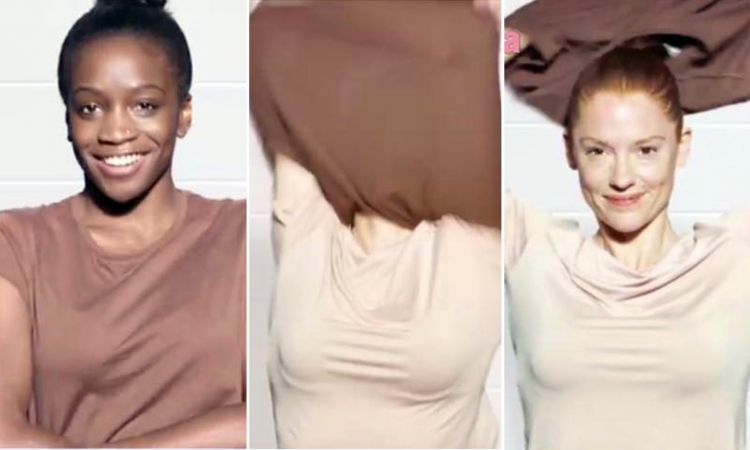Profiting from the Global Skin-Bleaching Industry

Ah Dove, why did you have to take it there — not once, but twice?
You’ve probably heard of Dove’s latest controversial ad. It features a sequence of three women dressed in flesh-toned shirts. Each woman removes her shirt from over her head. The alarming aspect of the ad is the sequence: it shows a black woman taking off her shirt and instantaneously replaced by a white woman.
As someone who has used Dove products practically all my life, I sit here disappointed because I can no longer find it in me to support this brand due to its ignorance and what is clearly a lack of concern of the racial implications its very industry has historically had. If Dove truly were an ethically responsible brand, as they so profusely claim to be, then they would be careful to avoid advertising that could even remotely be considered racist. And yet they did not.
I have studied media semiotics. I can easily spot deeper messages being conveyed in advertising. With this ad, however, you don't need to have studied semiotics to see, clearly, how the act of removing the shirt signifies a transformation. Watching a black women take off her flesh-colored shirt to be replaced by a white woman, the message is clear: Dove products help lighten darker skin.
It is important to remember that ads, especially when they are presented in quick flashes like this one, leave a lasting imprint on the subconscious. It is a powerful tool and those who create these ads have the responsibility to consider carefully what content they are putting out. We live in a society that’s attempting to move past the damaging effects of racism. Ads that even hint at that world view need to be held accountable.
What adds insult to injury is the fact that the soap industry was one of the first to advance a racist agenda at the end of the 19th century, a time when scientific racism was on the rise. For Victorians who had neither the means nor the education to read such materials, racist messages were more communicated via images, a.k.a. advertising. These images, as Anne McClintock points out in her book Imperial Leather, “could package, market and distribute evolutionary racism on a hitherto unimagined scale”. These ads equated black skin as being “dirty” and suggested that using soap helped maintain “clean” and “whiter” skin.
Image credit: Twitter/@KristinaCDove
Only those who are unaware of the soap industry's racist past could look at this Dove ad and not see a parallel message conveyed. What solidified it for me was the fact that the shirts were the same color as the model. I had to ask myself: if this was somehow taken out of context, what was the concept behind the models taking off their shirts? That Dove makes you undress?
This question was answered in an interview with the black model who was featured in the ad, Lola Ogunyemi, in what was clearly crisis management mode. She said she was happy with the ad. The interviewer states that the concept Dove intended to convey was “that Dove has products that suits all skins”. And then it hit me. This ad’s first line of communication wasn’t solely a subtle form of social racism, it was advocating skin bleaching.
The way I see it, Dove is tapping into a phenomenon that’s happening at this very moment. Skin bleaching is currently a 10+ billion dollar industry. Dove’s ad is exploiting this devastating trend to make a profit. If skin bleaching is already working in the minds of individuals and they see an ad like this, a subconscious association is created that Dove can ultimately lead to a transformation towards whiter skin.
In the interview Ogunyemi states there’s a line in the longer 30-second TV commercial that says “All skin deserves gentleness”. As news of the dangers of skin bleaching and its harshness on one’s skin is being reported, Dove is positioning themselves through these types of images and taglines as being the closest thing you can get to skin bleaching, without experiencing the detrimental effects that comes with bleaching your skin.
Image Credit: boredpanda.com
In another ad, Dove's slogan “visibly more beautiful skin from the most unexpected of places” means you don’t have to go the extremes of skin bleaching. Just using Dove's products in your shower every day and you can get one step closer to lighter skin. The words in this ad, before and after, communicate a transformation like the recent Dove ad. The transformation here being “before”, a visibly melanated woman, to “after” a white woman.
My point is a reaction to those who dismiss the controversy surrounding the recent Dove ad as somehow overblown. When you are ignorant of the context — the historical implications, the power of ads on the subconscious, the skin bleaching phenomenon — you won’t see the message Dove is trying to get across in not just one, but two, beauty ads.
The truth of the matter is that people are quick to give the benefit of the doubt so we can move past the uncomfortable conversation about racism. What they fail to realize is that these things must be nipped in the bud. Despite the "post-racism society" rhetoric going around, we aren’t that far removed from the time when it was okay to let things like this slide.
As a brand whose responsibility it is to bring better perspectives to society because they have the tools to do so through advertising, Dove should NOT be afforded the benefit of the doubt. In a world awash in advertising messages that appeal to the subconscious, we must be aware that brands are looking to increase profits in any way they can.









